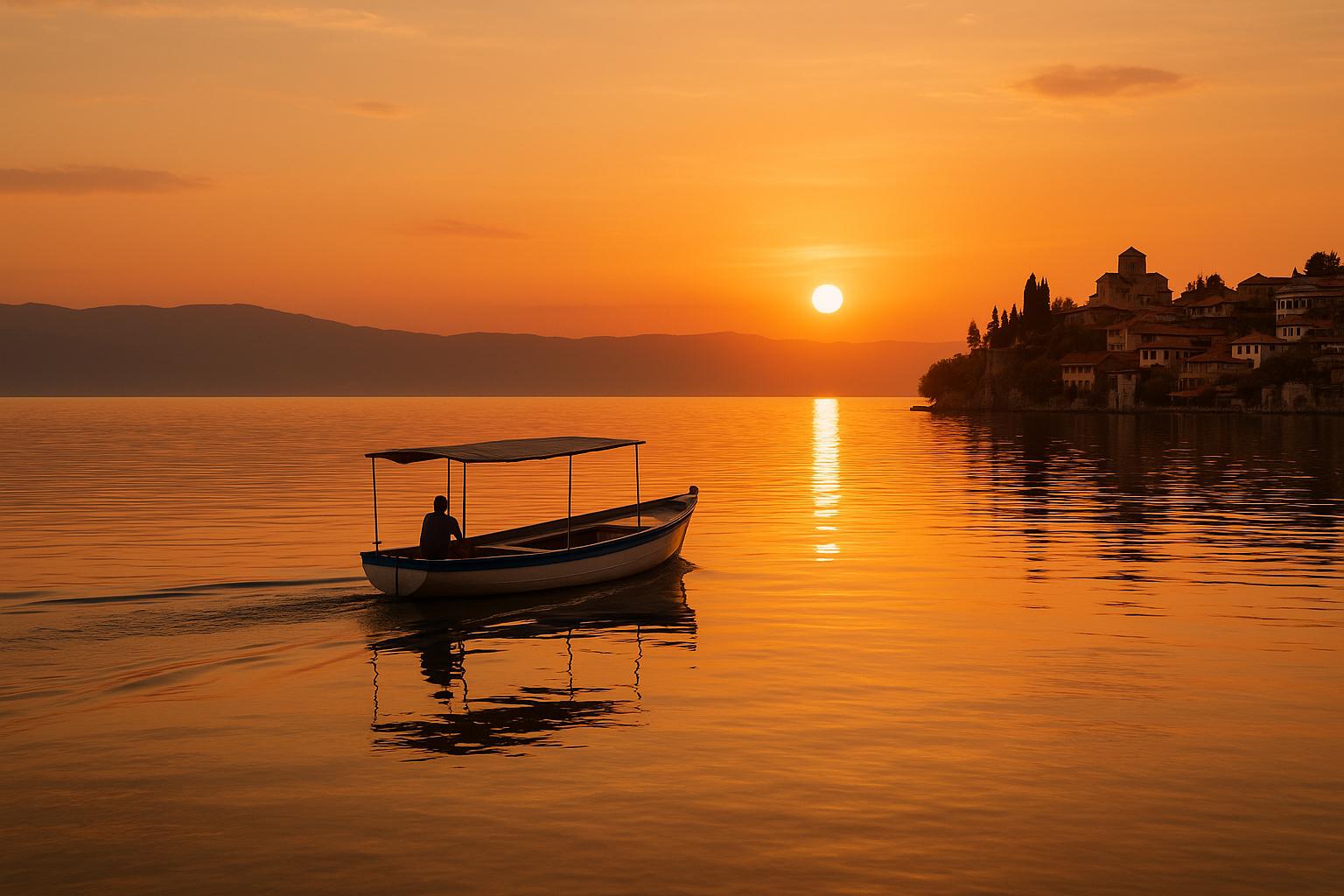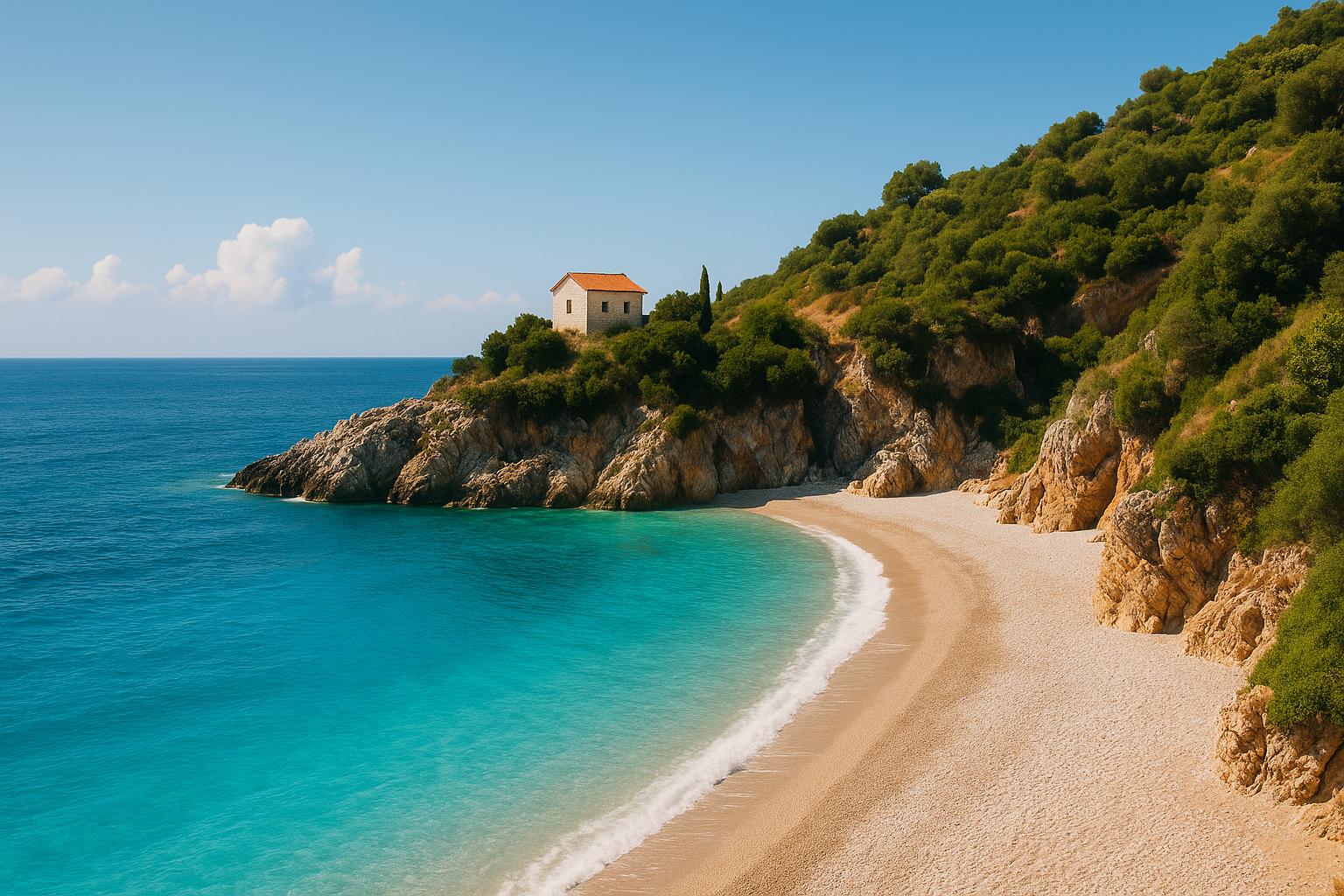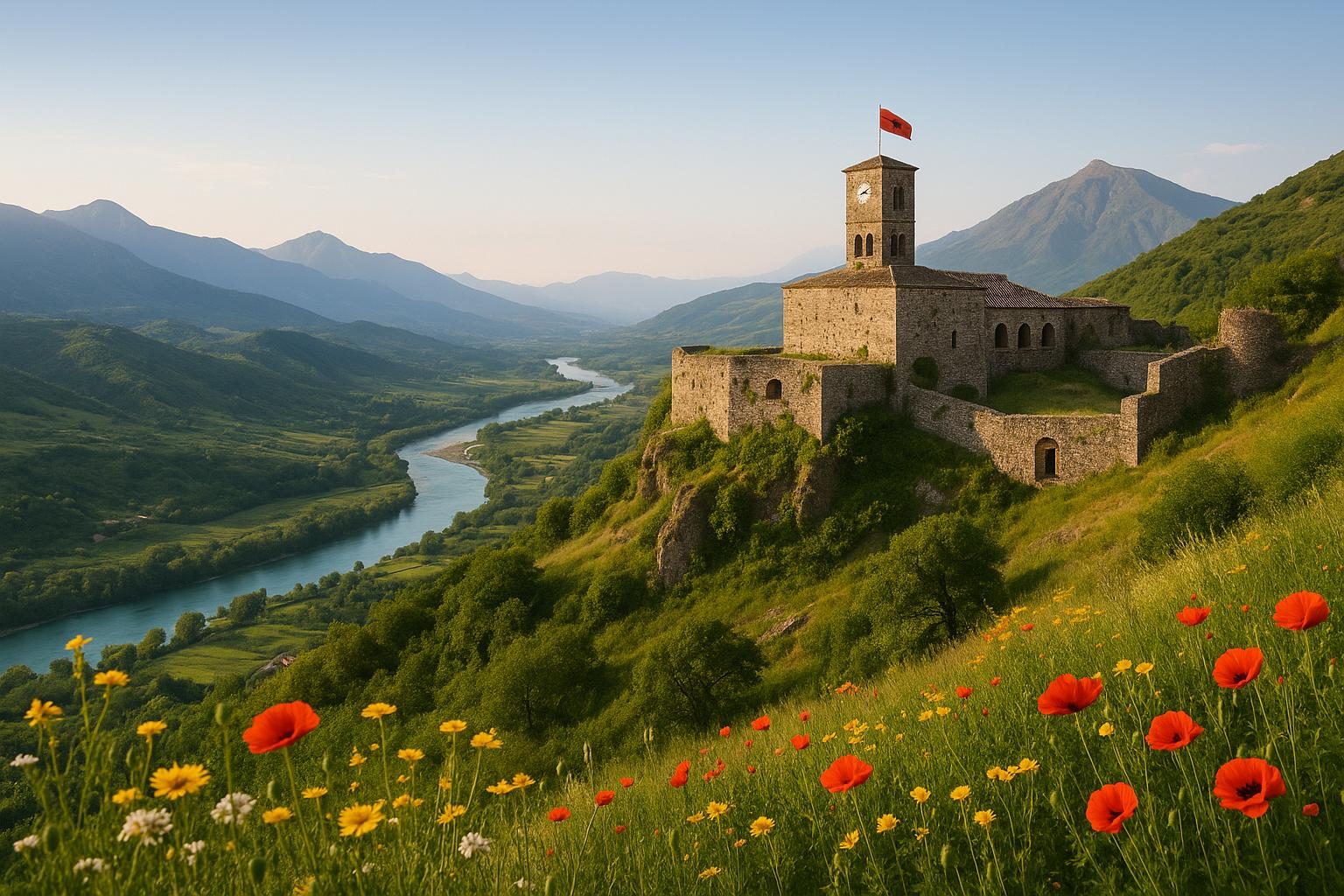Albanian weddings are more than a union between two people - they're a celebration of family and community bonds. These events blend long-standing customs with modern touches, often lasting up to a week and involving hundreds of guests. Here's what you need to know:
- Family: Plays a key role in planning, hosting, and upholding customs. Responsibilities include engagement celebrations, dowry discussions, and symbolic rituals like delivering the bridal gown. Families also handle guest hospitality and ensure everything reflects their heritage.
- Community: Supports the event by helping with preparations, attending in large numbers, and contributing financially through gifts. Singing, dancing, and processions bring energy to the ceremonies, creating a shared experience.
Key Challenges:
- Families face pressure to honor traditions while managing costs.
- Communities add logistical complexity but provide financial relief.
Albanian weddings highlight a partnership between family and community, balancing heritage with modern preferences. These events aren't just about the couple - they're a shared celebration of identity and connection.
ARRANGED MARRIAGE WEDDING IN ALBANIA (in the 21st Century) - PART 1
1. Family Roles
In Albanian weddings, family plays a central role, shaping every detail of the celebration. Their involvement begins long before the wedding day and extends through the week-long festivities.
Pre-Wedding Responsibilities
The engagement celebration is where family involvement officially kicks off, often rivaling the wedding itself in importance. During this event, close friends of the groom’s family visit the bride’s home, bringing gold jewellery as a gesture of commitment. The bride’s family, in turn, serves desserts and coffee to honor the occasion.
From there, both families work together to set the wedding date and discuss dowry arrangements. As Albanian blogger Rudina Bakalli explains:
Some brides will have a big dowry, some will be smaller, depending on the family's wealth.
Dowries often include items like bed linens, clothing, and jewellery, symbolizing the family’s support. In some regions, the groom’s family takes the bride shopping for essentials for her new home, reinforcing their acceptance of her into their family.
Another important tradition occurs midweek before the wedding: the groom’s family sends the bridal gown to the bride. In southern Albania, this delivery comes with symbolic gifts - rice for fertility, candies for sweetness, basil for a pleasant aroma, and flowers to represent blossoming relationships. The bride’s family reciprocates by presenting gifts to the groom’s close relatives during this ceremony. These rituals naturally lead into the main wedding events, where family roles take center stage.
Ceremonial Leadership
Family members take on specific leadership roles during the wedding ceremonies. The "man of the house" (zoti shpisë) acts as the main coordinator, managing invitations, appointing helpers, and ensuring everything runs smoothly.
The groom’s family organizes the "krushqit", a formal procession including key family members like the youngest niece, oldest nephew, sister-in-law, and uncles. This group is led by a senior, respected figure who is welcomed by the bride’s father with traditional raki. The youngest niece offers flowers to the bride, while other relatives escort her outside. The bride’s family, led by her father and sister, then accompanies her in an emotional farewell, often marked by tears and wailing as she leaves her home.
A symbolic ritual follows, where an elder from the groom’s side scatters corn, grains, beans, coins, and sugar cubes on the bride’s car and among the guests - representing abundance and good fortune. Once at the ceremony, the "man of the house" helps the bride out of the carriage, guiding her to her place in the event.
Hospitality and Participation
Albanian families are known for their generosity and hospitality, often going to great lengths to host guests. Wedding guest lists can range from 100 to 600 people, and some families even borrow money to ensure the celebration is grand enough to honor their family name. This dedication reflects the importance of maintaining a good reputation and showing respect to their guests.
The festivities last an entire week, filled with parties, dances, and ceremonies. Families prepare elaborate meals, featuring plenty of meat and regional dishes, to ensure everyone feels welcomed and well-fed.
Gifting and Blessings
Gift-giving is a key part of Albanian weddings. Guests and relatives present the couple with money, either in envelopes or thrown onto the floor during rituals, as a way of wishing them financial success. The popular wedding song "Napoleon" often plays during this moment, adding to the celebratory atmosphere.
Even after the wedding, family involvement continues. Traditionally, the father-in-law takes the bride to spend a night at her parents’ house within the first week of marriage. This gesture helps ease her transition into her new family while maintaining strong ties between both households.
2. Community Roles
While families uphold the core traditions, the community steps in to magnify the celebration, turning Albanian weddings into a truly collective event. Friends, neighbours, and extended social circles come together, offering their time, resources, and energy to ensure the couple experiences a grand and memorable wedding.
Pre-Wedding Responsibilities
The community's involvement begins well before the wedding day. Neighbours and friends pitch in with preparations, from helping with tasks to managing guest invitations. In more traditional settings, this might include cleaning wheat for the festivities or setting up the men's reception area. The invitation process itself often follows specific customs, with community members lending a hand to ensure everything is done properly. Close family friends may even join the groom's party when they visit the bride-to-be's home to formally ask for her hand, often bringing gifts as a gesture of support and goodwill. These collective efforts naturally transition into active participation during the wedding ceremonies.
Ceremonial Leadership
During the ceremonies, the community takes on vibrant leadership roles. Singing, dancing, and participating in processions are just a few ways they contribute to the festivities. They also play a part in gift-giving and in the exchanges of greetings between families, adding to the lively atmosphere that complements the more formal family traditions. At the groom's banquet, community leaders often give toasts, honouring elders and expressing gratitude to everyone involved. These contributions weave seamlessly into the cultural fabric of the wedding, enriching the experience for all.
Hospitality and Participation
Albanian weddings are a testament to the culture's deep emphasis on collective celebration and hospitality. Guests are expected to wear new clothing as a mark of respect for the couple and their families. Friends, neighbours, and relatives gather in large numbers to celebrate this milestone together. Weddings often host anywhere from 300 to 500 guests, with anything under 100 attendees being considered a smaller affair.
Gifting and Blessings
Gifts hold a special place in Albanian weddings, with cash being the most common and practical choice. These contributions provide the couple with financial support as they begin their married life. A particularly festive tradition involves guests showering the couple with money during traditional dances, adding both to the celebratory mood and the couple’s financial stability. Guests typically bring smaller bills for tipping the band and larger bills as their main gift.
This sense of community reflects a core Albanian value, as blogger Rudina Bakalli notes:
It is very important that the wedding is done very well to honour the family.
sbb-itb-dfcc1b7
Comparison: Benefits and Challenges
Albanian weddings are a vibrant blend of family and community involvement, each playing a distinct role in creating a meaningful celebration. While these contributions offer many advantages, they also present challenges that couples must carefully navigate.
| Aspect | Family Involvement | Community Involvement |
|---|---|---|
| Primary Benefits | Emotional support, preservation of traditions, close guidance | Financial help, festive atmosphere, social recognition |
| Main Challenges | High expectations, family conflicts, adherence to rigid customs | Coordination issues, social pressure, managing large-scale logistics |
| Financial Impact | Significant financial strain on immediate families | Costs eased by guest contributions and gifts |
| Flexibility Level | Often restricted by family honour and traditions | More adaptable to circumstances and the couple's preferences |
| Duration of Involvement | Lifelong connection and ongoing support | Primarily focused on the wedding, with some enduring social ties |
Families often face intense pressure to uphold traditions while managing financial constraints and adapting to modern expectations. This balancing act becomes even more complex for second-generation Albanians, who may feel torn between maintaining ancestral customs and embracing a contemporary lifestyle.
Traditional expectations, such as the bride integrating into her husband's family, can create emotional strain. For women accustomed to independence, this transition can challenge their sense of identity and add stress during an already complex time.
Community involvement, while offering immense support, can also complicate matters. The large-scale participation adds a celebratory flair, but coordinating such efforts can sometimes overshadow the couple's personal wishes. However, the financial contributions from community members often provide much-needed relief, making lavish celebrations more feasible.
The flexibility of these roles also varies. Families often feel bound by honour and tradition, leaving little room for adaptation. Communities, on the other hand, tend to adjust their involvement based on economic realities and the couple's desires, offering a more adaptable approach.
Extended celebrations, often spanning a week, amplify both the rewards and difficulties. Families carry the weight of maintaining high standards throughout the festivities, while communities participate selectively. This extended timeframe allows for deeper connections and memorable moments but also increases the risk of conflicts and logistical challenges.
Clear communication between families is key to easing these pressures. By openly discussing expectations, families can honour traditions without overextending themselves. Similarly, encouraging communities to embrace diverse approaches can reduce the social pressure on couples who may prefer smaller or less traditional celebrations.
Ultimately, both families and communities play a vital role in the success of these symbolic events. While their involvement brings undeniable support, it also requires couples to carefully balance tradition with their personal preferences and modern realities.
Conclusion
Albanian weddings are a vibrant blend of tradition, family ties, and community spirit, celebrating far more than just the union of two individuals. They serve as a living testament to the country’s enduring cultural values, where family and community come together to keep these traditions alive in an ever-changing world.
At the heart of these celebrations are the family roles that shape the ceremonies. From orchestrating gift exchanges and dowry presentations to performing symbolic rituals - like delivering the bridal gown accompanied by rice and basil for good fortune - families ensure that every detail reflects Albania’s rich heritage. Beyond the family, the community’s involvement transforms these intimate traditions into grand, village-wide festivities. Processions, traditional dances, and multi-day celebrations often bring entire villages together, turning weddings into powerful affirmations of social unity and cultural pride.
This partnership between family and community highlights Albania’s core values. Families provide guidance and uphold ceremonial customs, while communities lend both emotional and financial support, sharing resources to ease the burden on the couple. Together, they create a framework that allows these traditions to thrive.
In rural areas, weddings often feature a more pronounced sense of community, with neighbors and friends playing active roles in the celebrations. Urban weddings, on the other hand, may take on a more modern and streamlined approach, yet they still preserve the essential connection between family and community. Whether in the countryside or the city, Albanian weddings remain deeply communal, reinforcing social bonds and a shared identity.
For those curious to witness these traditions firsthand, Discover Albania offers curated experiences and guides to traditional ceremonies. Their platform connects travelers with opportunities to immerse themselves in the rich heritage that makes Albanian weddings such remarkable celebrations of unity and culture.
These traditions, deeply rooted in collaboration, demonstrate how family and community continue to sustain Albania's wedding customs. They are a powerful reminder that ancient rituals can coexist with modern life, thriving under the unwavering support of strong familial and communal bonds.
FAQs
How do Albanian weddings blend traditional customs with modern trends?
Albanian weddings are a delightful mix of age-old customs and modern-day influences, creating celebrations that pay homage to tradition while embracing contemporary styles. The heart of these weddings still beats with traditional elements like lively dances, symbolic gift exchanges, and the ceremonial display of the dowry. Yet, modern trends are making their mark, with simpler outfits and more intimate, personalised gatherings gaining traction.
This blend mirrors the changes in Albania's way of life, all while holding on to its deep-rooted cultural essence. Many couples now tailor these traditions to suit their own preferences, making their wedding day both personal and deeply significant.
What financial challenges do families face during Albanian weddings, and how does the community provide support?
Albanian weddings are famous for their lavish celebrations, but they often come with a hefty price tag - frequently surpassing €300 per guest. These costs cover everything from the venue and catering to music and traditional rituals, which can place a significant financial strain on families, particularly those with limited resources.
To help lighten this burden, the community steps in with traditional support systems. Family members and friends commonly provide financial contributions, lend a hand with preparations, and take an active role in the celebrations. This shared effort not only helps manage expenses but also deepens the sense of connection and unity, showcasing the rich cultural importance of Albanian weddings.
What are the main differences between urban and rural Albanian weddings in terms of traditions and community involvement?
Urban Albanian weddings today often reflect a mix of modern trends and traditional values, with a focus on more intimate gatherings. These events typically include close family and friends rather than extended community members, aligning with a contemporary way of life.
On the other hand, rural Albanian weddings remain deeply tied to age-old customs and are known for their grand scale. These celebrations often span several days and bring together entire villages, creating a lively and communal atmosphere. Traditions like ceremonial gunfire, wearing traditional clothing, and performing regional rituals are central to these weddings, emphasizing the strong sense of community and the preservation of cultural heritage.


